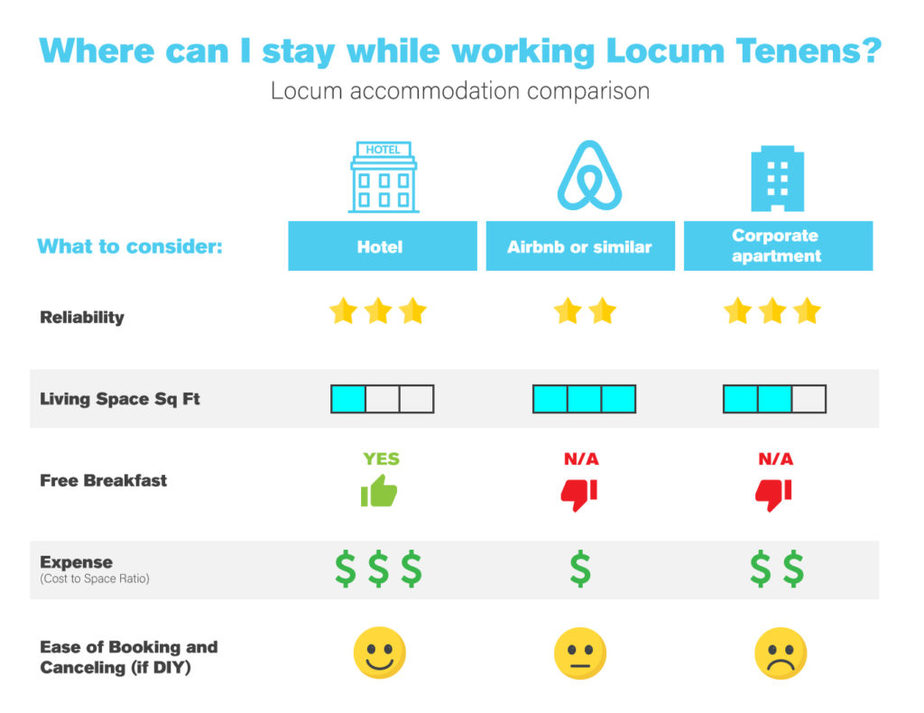

Vlad Dzhashi, MD
There’s nothing worse than feeling exhausted waking up in the morning before starting your first shift at a new hospital.
Believe me, I’ve been there and done that. It really sucks!
And I am not talking about being tired because you stayed up late watching movies on Netflix.
I am talking about losing sleep while staying at a crappy hotel room because you didn’t do your homework beforehand.
What do I mean by that?
Well, if you don’t know your housing options, don’t double check what you are offered, and don’t negotiate and request the quality housing you deserve, sooner or later you’ll have a few (if not many) sleepless nights.
That’s why I’ve created the most comprehensive locum tenens housing guide on the web! (Trust me, I’m not exaggerating! I’ve searched for one and couldn’t find it.)
So read carefully and I promise you’ll find lots of helpful tips, whether you are new to locum tenens or you’ve traveled as a locums doc before.
Here’s what I’ll cover today:
– Locum housing options with their pros and cons.
– Tips on how not to be a “sucker.”
– Locum housing DIY – does it make sense?
– How to negotiate your locum housing to get the most of it.
– At the end, I’ll also reveal a LocumGuy’s “secret” on how to make money “out of a thin air” while traveling for locum work.
So stay tuned and read till the end!
Let’s dive right in!
Locum housing option # 1: Hotels
Hotels come in all shapes and sizes, but 3-star accommodation is a locum industry standard. This is what you are most likely going to get for your locum travel.
The biggest pros of the hotel are that it gives a predictable experience and there are plenty of them to choose from.
Another perk is a hotel rewards program. Every large hotel chain has one. You get free points that you can use later for your personal travel expenses, room upgrades, etc. (Here’s a list of the largest rewards programs that can help you to compare them)
The key is to sign up as early as possible to start accumulating the points.
I actually was surprised by how quickly the reward points added up when I got a late check out after reaching a silver membership status in just a few months.
Now, here’s my word of caution about the hotels: if you work locum tenens long enough, at some point you may end up in a run-down, two-star hotel (disguised as three-star) with an old, noisy heating system and a funny smell coming from the bathroom, like I did a couple of times.
How did it happen?
The truth is that the locum companies don’t care which hotels you stay in. So it’s eventually up to us to screen the hotels beforehand.
How do I do this?
I use the TripAdvisor website or app.
It’s got a super helpful “traveler photos” section where you can see actual rooms and amenities pictures uploaded by the hotel guests, which gives me a very good idea of what I’m actually going to get.
I also always check the hotel rating and would say NO to anything less than 4.0.
This simple routine only takes a couple of minutes but will save you from sleepless nights.
What else do I check beforehand?
I always make sure the hotel amenities include a gym and a kitchenette (aka small kitchen).
Now, even if you don’t want to bother cooking for yourself, rooms with a kitchenette tend to be a little more spacious, and you are guaranteed to have an actual fridge (not just a freezer) and a microwave.
This way, even if you order at a restaurant and take the food home, you’ll be able to keep and finish it the next day.
Hotel tips:
1 – Sign up with the rewards program.
2 – Do not ever agree to anything less than 3 star.
3 – Check TripAdvisor travelers photos and ratings.
4 – Consider getting a room with the kitchenette.
Luxury tenens, anybody?
Ok, what if for some unclear, random reason, you are attracted to the higher standards, and every time you think of a 300 sq ft hotel room, you get nauseous and claustrophobic?
Not a problem!
There’s always an option of upgrading your hotel room to a suite. You could pay out of pocket for this ($30-$50 extra per night on average), use your reward points, or have the agency/hospital cover the difference.
Onward.
Locum housing option # 2: Airbnb or similar sites
Renting an Airbnb apartment would pretty much always give you more bang for the buck: you get a more spacious place to stay, a better-equipped kitchen and overall a more private, home-like experience.
It also may be a better choice if you plan to bring your spouse or family with you.
Here’s a problem though: anybody can list his property and call himself “a host.” So unlike hotels, there’s really no “big brother” watching and keeping track of the quality.
A few times I’ve had a quite unpleasant experience with both VRBO and Airbnb apartments, so I’ve come up with very strict but simple criteria to filter out the “bad” and the “ugly.”
The first thing I do is read the actual reviews, paying close attention to the most recent ones. I only consider properties with 20+ reviews (the more, the better) and a rating of above 4.5 stars. This is a first proxy for the quality.
Second, I only pick the listing by so-called “super hosts” — those are highly rated hosts with great track records.
Trust me, if you use these two simple criteria, you’ll stay away from trouble 99% of the time.
Now, if you book your own housing, there are a couple other things to keep in mind:
One is the cancellation policy for each particular rental. Unlike hotels, it is usually not that flexible and it may vary among them .
Most hosts won’t let you cancel 24 hours before your stay, and some hosts will only reimburse 50% of your stay even when canceled months in advance.
That’s especially important since as a locum, you could get your shifts canceled (although no later than 30 days before the shift is scheduled). That’s why the only two cancellation options I would accept are “moderate” (lets you cancel 5 days in advance) and “flexible” (can cancel 24 hours in advance).
Another hack I’ve learned booking apartments myself is that you should always start looking for a place ahead of time (at least 3 months before your shift dates), since good rentals (great cost/quality ratio) are gone very early.
Finally, although Airbnb has the most listings, there are many other decent sites you can use for short or long-term rent:
Airbnb checklist:
1 – Rental should have more than 20 reviews, with a minimal rating of 4.5 stars or above.
2 – Stick with “Super hosts.”
3 – Consider only apartments with “flexible” or “moderate” cancellation options (important only if you book your own housing).
4 – Book early (important only if you book your own housing).
Onward.
Locum housing option # 3: Corporate apartment
The corporate apartment has similar pros of a hotel since it’s listed by “professional” people, and much like Airbnb, it gives you more of a home-like experience.
I recently stayed at one of these apartments and had a great experience. So far I think this is probably the best option out of all three.
If you plan to find corporate accommodations yourself, just google “furnished” or “corporate” apartment + your location. I’ve also used some dedicated sites which have lots of listings and can be searched by location.
Keep in mind that most corporate housing lease terms start at 30 days, and there are fewer options to choose from compared to Airbnb housing.
Now, the main drawback of the apartment rentals (both Airbnb and corporate) is that they will have fewer amenities compared to the hotels (e.g. no pool, no vending machines), will have no breakfast and no room service, which may be a dealbreaker for some.
Finding housing yourself - to DIY or not to DIY?
All three housing options can be covered by your locum agency and hospital you work with, or you can do it yourself.
Most of the time I prefer others to take care of my locum housing, but there are times when the DIY option makes sense. This can include times when:
– You work directly with the hospital/clinic and they don’t want to deal with your travel arrangements.
– You prefer a bigger space, and the agency/hospital is not willing to walk an extra mile to make you more comfortable (usually not a good sign).
– You travel with pets and the hotel is very restricting about that.
– You’ve got a taste for something special and/or super expensive (e.g. house at the lake) or something weird (e.g. treehouse). You never know, right?
Housing Negotiation Tips:
Now, it’s time to get down to work and negotiate the best possible accommodation for ourselves.
1 – First thing first: you need to make up your mind and decide on which housing options you would like.
2 – Second, remember that in locum business, everything is negotiable and housing is no exception. And most, if not all, locum companies will agree to rent a decent place for you as long as YOU ASK FOR IT!
So never hesitate to request the housing option you want!
3 – Third, let your agency/hospital know about your housing preferences BEFORE you are “presented” to the hospital. This way there are no surprises on either end.
But what if you haven’t negotiated your housing upfront and you are not happy with where you are staying?
It’s actually very easy to request an upgrade (getting an apartment or a suite), especially if you’ve worked with the agency or hospital for some time.
Here’s the exact script that I’ve used before:
“We’ve worked together for a while and my overall experience has been great. The only thing that bothers me is this tiny hotel room I am staying at. It just gets too depressing spending so much time in a small space! That’s why I wanted to get an upgrade.”
Now that we know all our options and how to properly negotiate the locum housing, let me reveal a cool hack to make an extra $.
The DIY “hack” for frugal doctors:
Here’s what you need to do:
1 – Find a cheap room/entire place that runs beyond the average $100-130/night hotel rate.
It can be something you found on Airbnb or let’s say one of your colleagues or family member rents out a room or a guest suite for a reasonable price (it really depends on the location, but I’ve seen $30-50/night for a decent room and even studio/apartment).
2 – Look up the 3-star hotel rates in the area you will be staying.
3 – Talk to the agency/hospital you work with and request the housing reimbursement at the rate you’ve discovered (usually runs at about $100-130/night).
4 – Cha-ching! You get your money and say many thanks to the LocumGuy!
Now, let’s calculate how much you can actually make:
Pretax gain: (14 shifts a month which translates into a 16-night stay):
Let’s say you spent $50/night and you got your $100/night reimbursement, so you’ll pocket $50/night difference, which will give you a total of $800/month or $9600/year.
Almost $10K! Out of a thin air!
Not bad!
Now, this approach is not for the faint-hearted, but I know frugal physicians who’ve mastered this strategy for additional income.
Conclusion:
I’ve covered a lot of ground today, and now you know everything you need to get the best locum housing possible to have a home away from home!
P.S. What locum housing do you prefer? Why? Please let me know in the comments below!

- Jumpstart your Locums Career!
- Sign up for my coaching to access:
- Top Gigs
- Top Pay
- Unique resources
- No stress
- Jumpstart your Locums Career!
- Sign up for my coaching to access:

- Top Gigs
- Top Pay
- Unique resources
- No stress
As featured on














My locums company has given me the option to either have them arrange and pay for travel/hotel directly, or give me a daily per diem to purchase myself. I was thinking it may be a good idea to do per diem in order to get points on credit card and reward programs, as well as pocket a little money if I’m frugal with my purchases. The only issue is the per diem will be counted as taxable income, while it won’t if the company arranges and pays directly. I’m also wondering if I may get better options if I have the company take care of everything; they’re offering about 200-300 per day. Do you have any insight regarding this?
Thanks,
Zach
Zach, Hi!
What do you mean by per-diem rate?
Per-diem travel reimbursement is paid to the employees only, e.g. it falls under W2 income umbrella. As a locums doc, you are 1099 and not W2.
Are you getting paid as an independent contractor(1099) or employee (W2)?
As far as I know, reimbursement for travel expenses (for 1099 or independent contractor) is not taxable as long as you deduct your expenses and get reimbursed within the same tax year. That’s what I was told by my CPA.
I’m 1099. They offered to either book my travel (hotel/car/flight) directly or give me a daily per diem (200-300 per day) to book my own travel. According to them, the per diem will be considered taxable income, but what you say makes sense. So basically it should cancel out when deducting for taxes. Thanks for all the hard work! Much appreciated!
One more question. Any input regarding getting an LLC or C/S Corp? Is it beneficial for tax purposes?
Zach, Hi!
It depends.
When I spoke with my CPA, he didn’t recommend to form an LLC or S-corp. But since every situation is different, I strongly encourage you to seek a professional opinion for your particular case.
Now, there’s a couple of misconceptions about why you DO want to form an LLC and/or S-C/Corp:
1 – As a locum doc you DON’T have to LLC or S-Corp to deduct your professional expenses (e.g. cme fees, buying a printer or laptop, phone bills etc.). All sole proprietors who get 1099 income can do that.
2 – Another misconception is that you need to form an LLC to protect your personal assets in case of malpractice claim is brought against you and the malpractice insurance doesn’t cover all the payouts. Here’s a good article that covers it: https://www.acepnow.com/article/sheltering-personal-assets-medical-malpractice-liability-overrated/
If you don’t have time to read it, the bottom line is: it’s highly unlikely that this will happen hence forming LLC as a “asset protection” strategy is probably overrated.
I hope it helps!
Hello from beautiful Montana,
We have a lovely Airbnb and are Super Hosts for three years running.
We would like to invite you to check out our listing at Airbnb “A Wright Place To Stay In Missoula” You will find us very comfortable, quiet and close to Community Hospital and Providence Women and Family Health Care.
Looking forward to working with you to assure the best housing for visiting doctors, nurses and other professionals.
Judy Helm Wright–Author–PetParent–IntuitiveWiseWoman
I am not sure where you’re getting your information, but good topic.
I needs to spend some time learning much more or understanding more.
Thanks for wonderful information I was looking for this information for
my mission.
There are a few websites that are focused on housing for travel nurses or med students. They have great deals there, better than Airbnb.
What’s a typical stipend rate to book your own?
Melissa,
$100-130/night.
Hi,
Thanks for the guide! I’m about to do my first locum gig. My agency told me they’d give $4000 a month to cover lodging/car rental/etc. Since I’m bringing my own car, the bulk of that money (or all of it) could be applied to housing. Since I’m going on a 3-6 month assignment, does it make sense to splurge on a really nice apartment and rent some furniture for the amount of time I’ll be there? With covid, amenities are sort of pointless to me. I’ve been dying to stay in a high rise once in my life, but I don’t know if that’s prudent. What do you think?
Hi LocumsGuy,
I try to keep my locums work within commuting distance from my home. Sometimes that means I go home for 2.5-3 day weekends & stay at my locums area working 4d/wk. It is my greatest preference if the assignment is more than 30 days that I be able to leave my things & exclusively occupy the space for the entire time so I don’t need to throw out groceries & pack up everything every 4 days & then move back in again after 3days at home. I recently had a locums assignment where I had to move sometime 3 times in a week! It was exhausting. To save money on the contract, the locums company allowed the facility to directly manage my housing. This was a really bad idea & was never mentioned in the arrangement process.